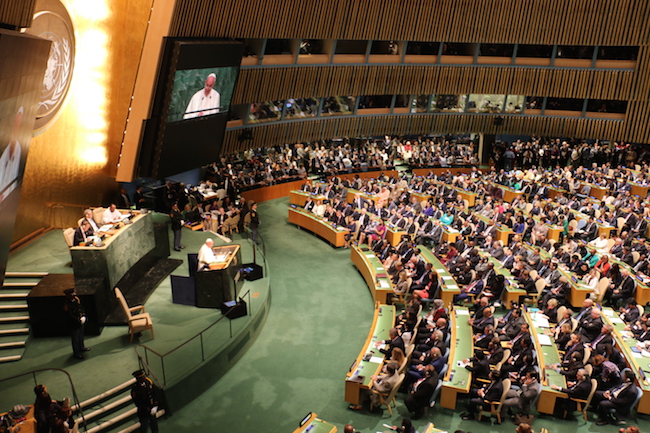
By Ben Tanosborn
Humble Francisco appears to have chosen, from the time he accepted his papal tasks, a narrow path with overgrown thorny brambles; also a major role as arbiter in the West between two ideologies which view very differently both the exercise of power and the distribution of wealth.
These ideologies, as different as night and day, can only reach an armistice, if not final peace, at a critical point either during sunrise… or during sunset. And Jorge Mario Bergoglio, better known post white-smoke at the Vatican as Francisco, Francesco, or Francis, would like to see the world reach that critical point via universal understanding and acceptance of compromise.
These two ideologies could be identified as possessiveness and sharing. Possessiveness, or the idea to possess or dominate others, via material wealth and/or power, evidenced before our eyes as materialism and consumerism; and sharing, the idea of involvement, participation and, at times, generosity (unselfishness).
Some of my old friends are already saying that finally, after almost half a millennium since the Society of Jesus’ founding, the Jesuits have invaded and taken over the Holy See; “Che” Francis leading the celebratory parade in a little Fiat, not in a Rolls-Royce… in a procession of dispossessed masses marching under the multiple banners of liberation theology, ready to take over from capitalism’s elite both its wealth and its power.
I, however, am not quite ready to share in that assessment.
Francis, I am cautiously convinced, has outgrown that phase of liberation theology of old and replaced it with an approach of inclusiveness and compromise.
Two days before Pope Francis arrived in Washington; I visualized him saying mass in Havana’s Revolution Square, sharing the “Plaza” with another Argentinian – just in spirit reflected in the iconic image of Ernesto “Che” Guevara. A true pragmatist of Latin America’s liberation theology of the 1950’s, Che’s life of armed struggle on behalf of the powerless and impoverished was cut short at 39 years young, at the pinnacle of his fight for the oppressed in Latin America – Bolivia in this case. Five years later (1972), Jorge Bergoglio, put in charge of Argentina’s Jesuits, and barely 36, was struggling with his own authoritarian nature which demanded a strong moral reaction against social injustice, poverty and lack of human rights: the marginalization of the masses.
The Church (Jesuit Order) made a decision to send this young, rebellious priest into exile and, by so doing, whether by design or divine intervention, re-baptized for the world a milder, more humble Jorge Bergoglio, who would later become Archbishop of Buenos Aires, a prince of the Catholic Church… and now its leader by the name of Francis.
Some of us who grew up in either obscurity of religious faith, or who were raised in faith but lost it for whatever reason, may not answer Francis’ request to pray for him, but will gladly join this man of love and humility in best wishes as he tries to impart much added wisdom on transcendental issues of our time, principally defined these days as lack of peace, unjust distribution of income/resources, disregard for climate change, and forced human migration – whether due to war or economic plight.
Sadly, we may tend to demand the unreasonable from this man, a mortal and imperfect sinner by his own account; particularly from those who have a specific agenda to follow. I have been accosted by friends who, believers or non-believers in the tradition of the Catholic Church, do not value any strides in Francis’ reach, whether in substance or even in tone which do not have immediate and dogmatic major change, such as acceptance of abortion; or softer topics, which most of us see as evolving, if slowly, within the Church, such as elevation of women to the priesthood and the end of priests’ celibacy. Francis’ unique role in the Church as either a revolutionary evolutionist or as an evolutionary revolutionist seems to be invisible to these people… but some of us see hope. We see hope in following the doctrine that for this planet and our human species to continue to exist in harmony and balance, nations and their leaders must follow the path of compromise as never before. And that is the doctrine that Francis would like to add to any non-religious, or religious catechism that we wish to choose, and follow, in our lives.
A visit by Francis has been most timely, and symbolic, to forge a preamble of goodwill between the US and Cuba; and, most importantly, to the gathering of the UN General Assembly conducting critical discussions on Syria, ISIS, refugees and, hopefully, better understanding and compromise affecting China, Cuba, Iran, Russia and the United States through policy positions and, in some cases, meetings of their leaders.
Thank you for your “humildad,” and the softness in your approach, “Che” Francis.




